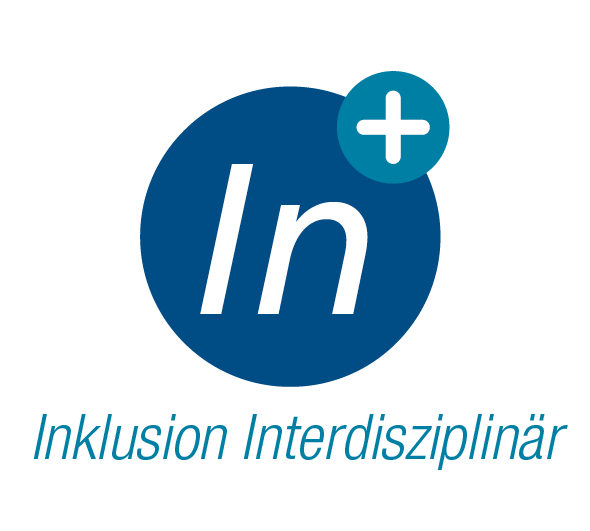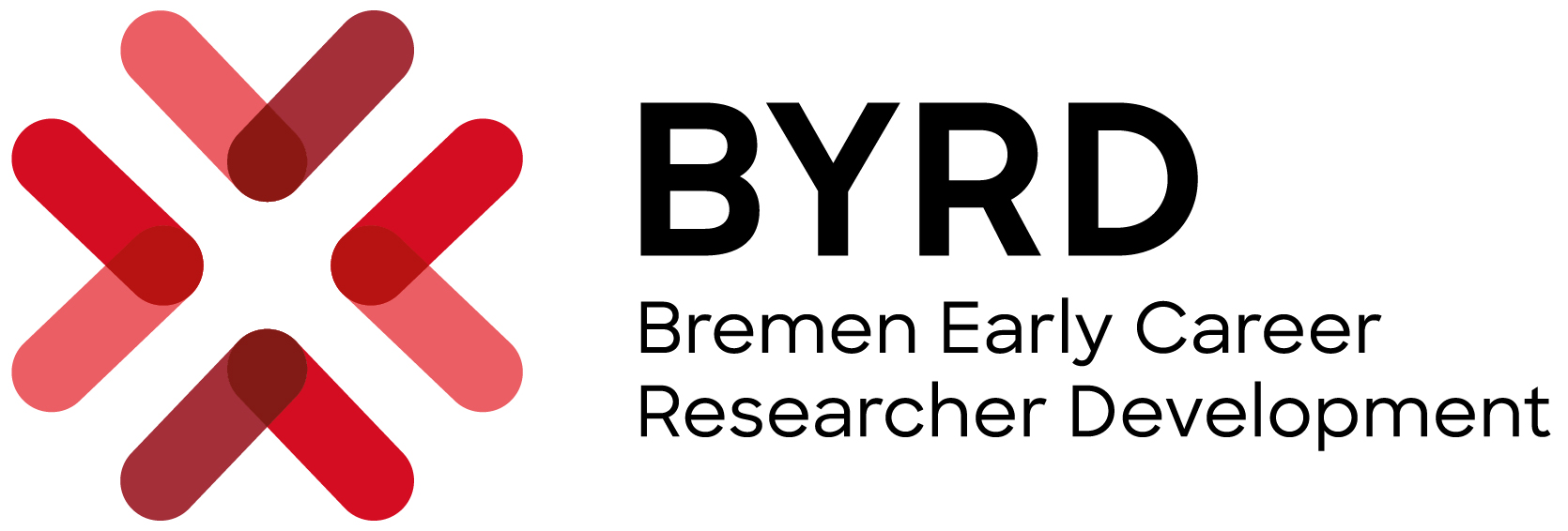Postdoc Network Groups

Get your postdoc network going
Do you work as a postdoctoral researcher at Bremen University and would like to connect to other researchers in a similar position? Do you have ideas for joint or interdisciplinary projects? Would you like to support and further educate each other as a group?
Founding a BYRD postdoc network offers all these opportunities. Together with at least two other postdocs at Bremen University, you create a network group concept indicating your undertakings and objectives. You then hand in this concept with your application for recognition as BYRD postdoc network.
Once accepted, you have the opportunity to apply for funding of up to EUR 2.500 per year for the following activities:
- Organizing a conference
- Inviting speakers for workshops and talks
- Issuing co-authored publications
- Running workshops with external trainers for career development, teaching, science communication or collegial consultations
For regular meetings in your network, we at BYRD can support you with the necessary infrastructure such as a room with specific technical devices.
We explicitly invite (senior) researchers and (senior) lecturers within the newly built tenure track model to found networks.
Contact
If you have any questions or if you plan to build up a postdoc network, we will be happy to help. Please contact Dr. Imke Girßmann:
Imke.Girssmannprotect me ?!vw.uni-bremenprotect me ?!.de
0421 218 60329
How do I initiate a postdoc network?
- Starting as a group of at least three members, put up the framework of your thematic direction under a significant title and a collective leitmotiv. The framework should be either interdisciplinary research topics or shared methodological respectively teaching concepts. Ideally, the group will consist of 6 or more members by the end of the first year.
- Write a concept for your network project and explain how your single research projects will contribute to and benefit from the group activities (3 - 4 pages). Hand in a short description of your network activities in German and English for the BYRD website.
- Announce one or two speakers who serve as contact persons for the network.
- Submit a yearly report on your network activities.
Current postdoc networks funded by BYRD

The network Inclusion Interdisciplinary (In+) aims to create a platform for interdisciplinary exchange on research and teaching in the field of inclusive education. More specifically, In+ is a place for constructive dialogue for anyone interested in inclusive practices associated with various school subjects and inclusive pedagogy.
At the University of Bremen, In+ is the first initiative going beyond the already existing format of Doc-Networks that allows status group of post-docs, researchers and lecturers to engage in communication. A central goal of the network is to strengthen the transfer between scientific research and school practice. On the one hand, such collaboration creates improved opportunities to integrate theoretical and empirical insights gained from scientific inclusion research into the various phases of teacher training in a sustainable manner. On the other hand, In+ also intends to incorporate the knowledge acquired in practice into research and teaching, thus initiating an iterative process of mutual theory-practice transfer. Furthermore, the network also aims to be a contact point for other (non-university) institutions that are theoretically or practically involved in inclusive education. In order to achieve these goals and to foster such cooperations, various event formats are conceived and realized in the activities of the joint network (regular working meetings, colloquia, conferences and workshops).
The name of the network "Inclusion Interdisciplinary" – in short In+ ("In-Plus") – is a reflection of its programme: In particular, the + sign is intended to symbolize the diversity of the disciplines, professions and areas that come together, namely research and teaching, theory and practice, didactics and pedagogy, and thus to emphasize the openness for a multifaceted and interdisciplinary exchange.
All interested parties are cordially invited to participate and can contact the network initiators if they have any questions.
Speakers:
Joanna Pfingsthorn, Researcher, Fachdidaktik EnglischMore
Julia Weltgen, Researcher, Inklusive PädagogikMore
Lisa Schüler, former Researcher, Fachdidaktik Deutsch, now Professorin für Sprachdidaktik des Deutschen an der Universität Bielefeld More
We live in times of global challenges. These challenges such as climate change, resource scarcity and pandemic threat have become too ubiquitous to be solved through minor innovation processes. It rather seems that existing practices of problem-solving have been exhausted. Therefore, the call for transformation in the sense of disruptive, pathbreaking changes has become vital. At the end of the 20th century, post-socialist countries have experienced a radical transformation: The centrally planned economies transformed into a market system, and the one-party rule into democracy, and the consequences of these changes are still effective today. The radical system change was conducted by shock therapy in many countries, such as the GDR, the Czech Republic, and the Baltic countries. Everyday life, social networks and all areas of society were changed disruptively. We are only beginning to understand the long-term consequences of this historically unique event, not to mention the lessons learned for today.
This is where the Postdoc-Network "Learning (from) Transformation" comes in. We ask the following questions: Given today's pressure to transform, what can modern politics, economy, and society learn from past transformation processes? How can transformation succeed, given the various uncertainties and socio-economic obstacles? Finally, which lessons can be learned from the cases of post-socialist transformation for the challenges ahead?
We aim to bring together economists, historians, political scientists, sociologists, and colleagues from any further discipline from the University of Bremen and its affiliated institutions to discuss the above (and related) questions. We seek to share and extend our knowledge within regular meetings, the so-called "coffee breaks", provide information about internal colloquia, international conferences or teaching classes, organize events or excursions and collect calls for research funds on the topic “Radical transformation”. The long-term goal is to exchange research, get impulses for future studies, extend prevailing theories and methods, and publish joint work in the realm of our scientific qualifications.
Speakers:
- Dr. Ann Hipp, Postdoc in the research group “Economics of Innovation and Structural Change” at the Faculty of Business Studies and Economics, leader of sub-project 1 in Mod-Block-DDR and of the DFG Network “The Dynamics of Innovation Systems” more
- Dr. Mariia Shkolnykova, Postdoc in the research group “Economics of Innovation and Structural Change” at the Faculty of Business Studies and Economics, leader of the research area "Innovation and new Technologies" more
Our research network Health Humanities and Audiovisual Cultures (He:Ku) focuses on the relationship between health and media cultures/aesthetics. Internationally, Health Humanities is an interdisciplinary field between natural sciences, humanities, social sciences, cultural studies, and the arts. However, the cultural, performative, and (audio-)visual dimensions of illness, health, and well-being have not been discussed in depth. He:Ku aims to explore approaches at these thematic and methodological intersections. Our goal is an interdisciplinary collaboration and the transfer of research and teaching in an interdisciplinary think tank. The idea of our project is to compare and discuss approaches from the health sciences, cultural studies and media aesthetics as well as related disciplines and to transfer them into research and participatory events: colloquia, a World Café with cultural workers from Bremen as well as public film discussions with external guests and the audience.
Speaker:
PD Dr. Solveig Lena Hansen, Senior Lecturer, Public Health Ethics, Faculty 11: Human and Health Sciences more
Founding Members:
Tobias Dietrich, M.A., Lecturer, Film Studies and Film Education, Institute for Art History - Film Studies - Art Education, Faculty 9 more
Dr. Thomas Hehlmann, Senior Lecturer, Public Health and Health Literacy, Faculty 11: Human and Health Sciences more
Dr. Martina Wachtlin, Senior Lecturer, Public Health/Health Sciences, Faculty 11, Research Focus among others: Performative Social Sciences more
The aim of the network is to bring together Ukrainian policy experts, practitioners, and scholars at various career stages to explore, analyze, and discuss contemporary developments in Ukraine. Within the framework of this postdoc network, we aim to facilitate collaboration with Ukrainian scholars currently based in Ukraine and elsewhere to provide interdisciplinary dialogue on areas of research as diverse as economics, gender studies, history, political science, and sociology. The network will organize event series, with a large part of participants coming from Ukraine, while combining in-person and online formats in order to allow for broad participation especially in times of war. Planned events include thematic workshops, colloquia, and guest lectures, with the promotion of interdisciplinary exchange being the key aim.
Speakers:
Dr. Ekaterina Paustyan, Faculty 07, Postdoctoral Researcher, Professorship of Institutional Economics more
Own project funded by the Central Research Development Fund:"Subnational elite cohesion and turnover in authoritarian regimes: a nework analysis perspective"
Dr. Seongcheol Kim, Faculty 08, Postdoctoral researcher at the Institute of Intercultural and International Studies (InIIS) and joint Principal Investigator of the DFG project "Between Populism and Radical Democracy, between Party and Movement: On the Discursive Afterlife of the Movements of the Squares"
Affiliated researcher at the Research Centre for East European Studies (FSO) at the University of Bremen more

